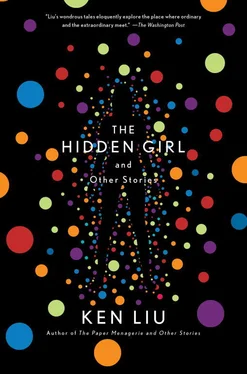She opened her mouth but then thought better of it. In this man’s world, she could only be a “good Jap” or a “bad Jap.” There was no room for just Takako Yamashiro, free of labels.
“You went to college?” He changed the topic.
“Yes, physics. I was in graduate studies when… this happened.”
He whistled. “Never heard of a girl physicist, Jap or no Jap.”
“I was the only woman in my class.”
He appraised her, the way one appraised a circus monkey. “You’re very proud of being clever. Sneaky is more like it. Explains the attitude.”
She stared back at him evenly, saying nothing.
“Anyway, it seems that you are being given an opportunity to help America and prove that you are indeed loyal. The men from Washington specifically requested you. If you agree, you can sign these documents, and they can tell you more when they pick you up tomorrow.”
She could hardly believe her ears. “I can leave Tule Lake?”
“Don’t get too excited. You are not going on vacation.”
She flipped through the stack of papers in front of her quickly. Shocked, she looked up. “These papers have me renouncing my American citizenship.”
“Of course.” He was amused. “We can hardly send you back to the Empire of Japan as an American citizen, now can we?”
Back? She had never been to Japan. She had grown up in Seattle’s Japantown and then gone straight to college in California. All she knew were the comforts of a tiny slice of America, and then this place. She felt dizzy. “What if I refuse?”
“Then you’ll have confirmed that you are unwilling to help the American war effort. We’ll deal with you and your family accordingly.”
“I have to renounce America to prove that I’m a patriot. You don’t see how stupid this is?”
He shrugged.
“And my family?”
“Your parents and brother will stay here in our care,” he said, smiling. “It will ensure that you maintain focus in your work.”
•
Takako was denounced as a Japanese loyalist, a Nisei who was willing to die for the Emperor and who had eagerly renounced her citizenship. The American authorities, in their compassion to not harm a mere girl, put her on the list of prisoners to be repatriated back to Japan in exchange for American prisoners captured by the Japanese in Hong Kong. The pro-Japan internees at Tule Lake congratulated her parents for her bravery while most internees looked at the family with pity. Mr. and Mrs. Yamashiro were bewildered. Her brother, another “No-No Boy” who had refused to answer those questions on principle, got into fights with the other prisoners. The family was shortly taken to the stockades, separated from the rest of the prisoners in camp, “for their own protection.”
The men from Washington explained to Takako what she was to do once the boat arrived in Japan. The Japanese would be suspicious of her and she would be interrogated and debriefed. She was to say and do whatever she needed to convince them of her loyalty to the Japanese Empire. To bolster her story, news would be leaked that her family members were killed for leading a prisoner riot that led to martial law being imposed at the camp. They’d think she had no ties to America anymore. She was to use all assets at her disposal—the men glanced at her lithe body meaningfully—to gain useful information, specifically about Japanese engineering developments.
“The more you give us,” they told her, “the safer you’ll make your family and your country.”
•
Takako’s Japanese, learned at home and in the markets of Japantown, was severely put to the test by the Kempeitai interrogators. She answered the same questions again and again.
Why do you hate the Americans?
Have you always felt an allegiance to the Empire of Japan?
What did you feel when you first heard the news of the victory at Pearl Harbor?
Eventually she was pronounced a loyal subject of the Emperor, a proud Japanese who had suffered at the hands of the savage Americans. Her English skills and science education were deemed useful and she was put to work for the military scientists, translating English papers. She thought she was still being watched by the Kempeitai, but she could not be sure.
The propaganda crews filmed her at work in Tokyo, a white lab coat on her. A woman physicist who abandoned America to work for the glory of the nation! She was a symbol of the New Japan. She looked into the camera, wearing a demure smile and professional makeup. It is not so much how well the dog dances, she thought, but that a dog is dancing at all.
Satoshi Akiba, a physicist and officer of the Imperial Army, was impressed with her. He was in his forties, looked distinguished, and had studied in England and America. Would she, he leaned in and whispered to her, be interested in coming to join him in Okinawa, where he was working on an important project and could use her help? He said this and then reached out to lift a strand of hair away from her eyes.
MARCH 1944
Springtime in Okinawa, a thousand miles from Tokyo, was warm, hot even. It was also quiet, almost pre-modern compared to the bustle of the cities on the Japanese home islands. Here, away from the constant broadcasts and exhortations to dedicate oneself to the war effort, the war seemed more distant, less real. Takako sometimes could even pretend that she was simply in graduate school.
She had her own room in the compound. But she seldom got to sleep in it. Most nights Director Akiba requested her company. Sometimes he wrote letters to his wife back home in Hiroshima, while Takako gave him a massage. Other times he wanted to talk to her in English before they went to bed, “for practice.” Her American habits and American education seemed to make her extra appealing to him.
Takako did not understand what Unit 98 was up to. Akiba did not seem to trust her completely, and he never discussed with her news of the war or his work. He was careful to assign her only the most innocuous tasks, reading and summarizing Western research that seemed to have little practical application: experiments on gaseous diffusion, calculations of atomic energy levels, competing theories in psychology. But the compound was highly secretive and closely guarded. More than fifty scientists worked there, and all the nearby farms had been cleared and the villagers forcefully removed.
Through the servants, her American handlers had gotten in touch with her. If she thought she had something of significance, she was to put it in her trash, wrapped in her womanly napkins. The servants would take the bundle outside the compound, seal it in a canister, and give it to a family of fishermen who would take it out into the Philippine Sea and drop it at a particular sunken atoll. An American submarine would pick it up later.
She thought about the bundles on their long journey to America, the white wrapping stained with her monthly blood, a parody of the Hinomaru that men would be reluctant to examine closely. She had to admit that her handlers were clever.
One day, Akiba was in a pensive mood. He wanted to go hiking in the woods inland, and asked Takako to come with him. They drove until the road ended, and walked deep into the forest. Takako enjoyed herself. She had not been given any chance to explore the island since her arrival.
They walked past the giant looking-glass mangroves, their vertical platelike roots nature’s version of Japanese screens. They listened to the chi-chi calls made by the Okinawan woodpecker. They admired the Malayan banyans, their aerial roots twisting and descending like nymphs climbing down from the branches. Takako silently prayed as she walked past the sacred trees, the way her mother had taught her when she was little.
Читать дальше












